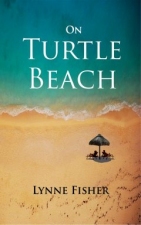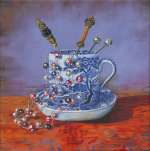
Have you ever been told that you think too much? I know I have. It might be in the same ballpark of people’s judgments as that of being too sensitive, because they can often be found co-existing within us. Sensitivity provokes thinking, as well as feeling, and thinking can in turn lead to sensitivity of feeling. And since many creative people by necessity use their thinking and feeling processes, I think this thinking too ‘much’ comes with the territory for creatives. But what is thinking too much? Too much for what, exactly?
Well what seems implied in the too, is that thinking excessively is bad for us (and the guy in the gif looks like he’s having a bad time for sure). We all know the dangers of overthinking something, only to find the actual doing far simpler than anticipated, and yes, we should be vigilant of that. But what I’m getting at here is that when someone accuses you of thinking too much, they are suggesting that you’re thinking too much for your own good. That you are harming yourself and your mental health with too much thinking. Where does it get you? is their subtext. What do you achieve by it? And that you are creating problems that don’t exist. Why would you do that? they think. You yourself may know that it’s what you think and how you think that matters. That it’s not a case of ‘I think, therefore I am’, but rather ‘I think, therefore I’m me’ and I’m not going to stop, thank you very much.
Let’s turn it around for a moment and imagine yourself saying ‘you think too much’ to someone else – someone who’s going into great depth, analysing a certain idea or situation or how they are feeling about something. How do you feel when you say these words? Well I would feel dismissive of what they were talking about or trying to describe. I would feel judgmental too. There could also be a defence mechanism or two going on, not wanting to be bothered by someone else’s questioning because you don’t want to question yourself. You may have reflected hard in the past and it only caused you pain and confusion, so you stopped because it became too difficult, and right now you’re fighting back with a bit of denial, repression, or projection. Or you may believe that life just has to be a simple case of being happy, not pestering yourself with problematical thoughts that get in the way of that, and if that means absorbing as truth everything you are meant to do in mainstream society to achieve a happy life, then you must do it. Chill out, for heaven’s sake, stop making too much of everything!
But what if you are a creative person who relies on thinking? If I hadn’t been a thinker, I’d never have written a novel or anything else I value and I certainly wouldn’t be doing this blog. Writers need to think, it’s in their job description. Music makers, art makers, all creative people use their heads and hearts, synchronising them in what can be a wonderful harmony. We have channels for all that thinking in a creative life, all that thinking can be put to good use. Not only that, all that thinking can be good for our development, to become a better person, a more self-empowered person. And that is a worthwhile aim that can lead to a deeper form of happiness, a kind of reconciled inner peace through acceptance of ourselves. But we have to tackle our thinking if we are to stand a chance of getting there. A case of no pain, no gain, which could almost be a natural law.
‘Life is difficult’ psychologist, Scott Peck, says in his opening line of The Road Less Travelled. And later on he points out that it’s absurd to tell people they think too much, when it is thinking that makes us human and that ‘the process of constant self-examination and contemplation is essential for ultimate survival.’ He goes on to say ‘Examination of the world without is never as personally painful as examination of the world within…’ and that is why ‘the majority steer away from it.’ And yet the pain becomes less important as one progresses on the path of self examination and self development. And as we go along this road less travelled we make constant adjustments to our values, our moral compasses and our life maps. We constantly evaluate, look at both sides of an argument, we go into the grey of things instead of simply seeing black and white, and we thereby develop empathy and increased understanding, we understand ourselves more and in doing so come to understand others. We carry on learning and carry on questioning. All this is the way it should be, otherwise we stagnate, we don’t grow, and we remain inflexible to the vicissitudes of life. If we don’t do this learning through thinking, we are, ironically perhaps, less likely to be able to go with the flow of life because we’re hanging on to fixed beliefs and set-in- concrete ways of judging life.
According to Jung:’ Thinking is difficult, that is why most people judge’, which in the above context makes a lot of sense.
‘The unexamined life is not worth living’, vowed Socrates. And here are some thoughts on what he may have meant by this from Wikipedia and Sparknotes . His claim would seem to suggest that ‘only in striving to come to know ourselves and to understand ourselves do our lives have any meaning or value. Socrates believed that philosophy – the love of wisdom – was the most important pursuit above all else. For some, he exemplifies, more than anyone else in history, the pursuit of wisdom through questioning and logical argument, by examining and by thinking. His ‘examination’ of life in this way spilled out into the lives of others, such that they began their own ‘examination’ of life, but he knew they would all die one day, as saying that a life without philosophy – an ‘unexamined’ life – was not worth living’.
And on the connections between thinking and creativity, here is an interesting article, by Mary Taylor who runs the Centre For Creative Intelligence, on The Highly Creative Person
Within it she comments, that the aptitudes of:
a rapid flow of ideas
divergent thinking
sharp sensory skills
strong intuition
high emotional intelligence
analytically–heightened consciousness (meaning clarity, accuracy and precision in thought and language)
Empathically–heightened consciousness (with an acute awareness and understanding of one’s own feelings as they occur and the ability to be highly attuned to the emotions of others, accompanied by an innate capacity to experience one’s emotional life to great depth along with a values-centered awareness)
Aptitudes which all contribute to creative intelligence – ‘a talent for making meaningful connections, even among seemingly unrelated elements and in so doing, bring forth new and valuable ideas, discoveries, inventions and works of art into one or more pre-existing or even new domains’.
Now I’m not putting creative people on a pedestal here, I’m simply looking at what I feel are facts. So in that vein, I’m asking – how could we operate in any of the above ways if we didn’t do a lot of thinking?
And for those of us who love to read, a nice quote from John Locke ( philospher and Enlightenment period thinker) : ‘Reading furnishes the mind only with materials of knowledge; it is thinking that makes what we read ours.’ (As well as marking passages in the margins of course ;>))
And to finish, taking on board the issue of thinking too much, here is a great animation on The Dangers of Thinking Too Much; And Thinking Too Little, from The School Of Life, to balance things out:
https://www.youtube.com/watch?v=p5zLY3Wi8Uk
‘There are dangers associated both with thinking too much – and thinking too little. The trick is to use our minds to access our most sincere, authentic and original thoughts.’ And the the transcript for the video can be found here
I’ll be taking a break from posting next week for my birthday, but I’ll be back with the topics of dealing with reviews for your literary endeavours, the good, the bad and the ugly. And after that I’ll be tackling marketing a novel – I’m far from being an expert, but I’ll share what I’ve gleaned so far.
Cheers for now!
(gif from giphy.com)
















You gave us a lot to think about!! In a society where thinking takes place in fleeting seconds and images flash by, thinking is becoming a lost art. Nicely done!
dwight
LikeLiked by 1 person
Thanks, Dwight! I’d never considered the idea that effective thinking may be becoming a lost art, that’s a great point!
LikeLiked by 1 person
What a thought provoking post–you really made me think! Ha!
As another person who thinks a lot, I understand what you are saying. A deep exploration of a significant topic is just what my left brain loves. And when making important decisions, careful thinking seems part of a responsible process. Looking at things from different angles, considering alternative views, learning from those who have gone before–all these can enhance our understanding and help us be more engaged, creative, responsive.
On the other hand, I also see that I can get on what I call a hamster wheel loop of repetitive or frantic thinking that serves no purpose and blocks whatever wisdom and guidance might be offered by my more intuitive side.
And there is sometimes a point where I can sense that thinking has taken me as far as it can. Beyond that, I am overthinking and it becomes counterproductive.
So, in thinking about thinking, perhaps there is, as in everything else, a balance.
What a great post. But then all your posts are. I love coming here to see what your thinking brain has been up to!
LikeLike
Thank you Galen, much appreciated sharing, as always! Yes, it’s got to be a balance between thinking productively and thinking counterproductively. Also maybe learning where to draw the line when thinking through a situation over some dilemma with someone, when that someone is hardly thinking about the issue at all! That’s what I’ve come across with a close family member, who would certainly say i think too much. And then there’s being with someone who thinks a good deal too, and before you know it, over two hours in a coffee shop have flown by, as happened to me yesterday! Cheers for now :>)
LikeLike
Just a quick glance at your blog and I feel we are kindred spirits!! Thank you so much for this article, I love it!!
LikeLiked by 1 person
Thanks, CurlyMom – I know that kind of feeling. I’ll be paying you a visit!
LikeLiked by 1 person
Happy Birthday for next week!
An interesting blog that, got me thinking 😉 I used to get told all the time that I thought too much. It always seemed to be dull people who said it (or that’s what I told myself anyway). On the one hand, I did over-analyse everything, and that could be self-defeating. On the other hand, it was all that thinking that led me to understand a few things about life, and, like you, to learn to write. I think your observations of the good skills that come with thinking too much are right (empathy and emotional intelligence etc) but for me it took a while for those skills to be mastered. That meant I spent a tormented childhood overthinking everything, but by my twenties all that thinking was paying off and I was starting to figure things out.
I’m looking forward to reading your self-publishing tales, that’s a road I’m likely to be taking in a few months and I’ll need all the help I can get (and will, of course, pass on whatever I work out too).
LikeLiked by 2 people
Same experiences here, on the whole. My overthinking in the past could certainly be detrimental at times and yes, it takes time to start seeing the benefits, many years really. But looking back, I wouldn’t have done it any differently because it helped me understand situations and people issues. To be fair to my parents, they never accused me of thinking too much, which in retrospect is quite something! Self -publishing – yes we can share, as there are a few things I’ve backed away from doing, that I think you have done eg newsletter sign up. I wanted to to it ‘my way’, choosing methods that felt ok with me, still on going of course, as it has to be! Cheers for sharing :>)
LikeLike
Here’s to doing it ‘your way’, I decided last week I needed to do the same. As my wise friend said to me ‘If you hate doing something, you won’t do it well, so it probably won’t work’. Good luck!
LikeLiked by 1 person
Exactly! A case of adapting the marketing to suit one’s nature as far as practically possible.
LikeLiked by 1 person
This is a wonderful piece, Lynne, I loved every word and every thought. The quotes were so apt and perfect in your context, and now I.m going to follow up some of your threads…
I read your blog aloud to my love and am about to go back and re-read and savour what you have written…reading something like this makes me feel so grateful (and also, so alive – one of the tests of good writing –) to you and to the internet for access to kindred spirits and thinkers… thank you, and please don’t go away for too long… enjoy your birthday XXX
LikeLiked by 1 person
Thank you so much Valerie! I felt on solid ground writing this one. Perhaps it was overdue within me to get my thoughts out on this. I do think thinking a good deal can be made to help rather than hinder in life. So long as one makes sure it’s the right way for you rather than detrimental, then it’s a bonus in my view. My hubby is off work for a couple of days next week, so that will come in handy for my birthday. Yes, I’ll be back soon enough!
LikeLiked by 1 person
I appreciated your asking how one would feel if the tables were turned – how would I possibly feel in the event of telling someone that they were “thinking too much?” It’s difficult for me to imagine laying that one on somebody, yet it seems we were socially expected to put up with it ourselves, and even internalize its folly as though it were essential truth we had somehow been missing out on. I recall you used this technique earlier with something similar, I can’t recall what the question was right off-hand, but I felt a similar sense of irk when I tried to turn the tables, as though I could barely fathom placing myself in the opposing position.
LikeLiked by 1 person
Yes, Andy, it’s a useful ‘technique’…I’ve only being doing this since I started blogging for some reason, I guess it’s a way of trying to see what mindset the comments may be coming from. Probably internally began when people would sometimes say to me about my art, ‘have you thought of doing simpler compositions?’ And a big one in painting is suggesting one should try painting looser, with less detail. This is what a lot of detail loving artists will get from artists who do very loose washes, brushstrokes and abstracts. There isn’t an existing comeback of suggesting someone’s painting is a bit too wishy washy, confused or ‘unresolved’. I got this out of my system in the novel! Apart from that, I’ve had the ‘you think too much’ many times! Thanks for sharing, Andy :>)
LikeLiked by 1 person